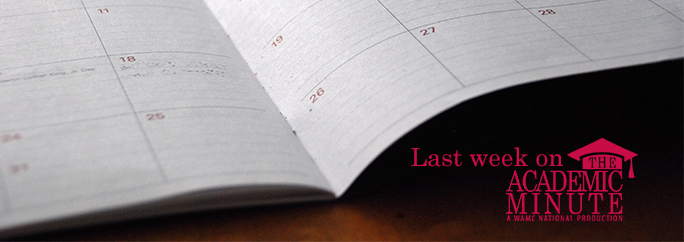The Academic Minute for 2020.01.13-2020.01.17

The Academic Minute from 01.13 – 01.17
Monday, January 13th
Ben Graham – University of Southern California Dornsife
Migrants Bring Value to Businesses They Own or Manage
Benjamin A.T. Graham is an associate professor of international relations whose work focuses on migration, foreign investment, and the relationship between economics and conflict. He also conducts research on power-sharing, unrecognized states, and the enforcement of human rights through quasi-judicial mechanisms at the World Bank.
Together with Jonathan Markowitz and Megan Becker, Professor Graham co-directs the USC Dornsife Security and Political Economy (SPEC) Lab. In addition to conducting academic research, the SPEC Lab trains students in applied data science and provides stats and research design as well as consulting office hours to students and faculty.
Tuesday, January 14th
Scott Allison – University of Richmond
Mothers as Heroes
Scott Allison has authored numerous books, including Heroes and Heroic Leadership. He is Professor of Psychology at the University of Richmond where he has published extensively on heroism and leadership. His other books include Reel Heroes, Conceptions of Leadership, Frontiers in Spiritual Leadership, and the Handbook of Heroism. His work has appeared in USA Today, National Public Radio, the New York Times, the Los Angeles Times, Slate Magazine, MSNBC, CBS, Psychology Today, and the Christian Science Monitor. He has received Richmond’s Distinguished Educator Award and the Virginia Council of Higher Education’s Outstanding Faculty Award.
Wednesday, January 15th
Kenneth Roemer – University of Texas at Arlington
Create Yourself in Many Voices
Kenneth Roemer (B.A., Harvard; M.A., Ph. D., Univ. of Pennsylvania), a Piper Professor, Distinguished Teaching Professor, and Distinguished Scholar Professor at the University of Texas at Arlington, has received four NEH grants to direct Summer Seminars and has been a Japan Society for the Promotion of Science Fellow and a Visiting Professor in Japan. He has been a guest lecturer at Harvard and has lectured at twelve universities in Japan and in Vienna, Lisbon, Germany, Brazil, Ireland, Canada, Hong Kong, Turkey, and France. He was one of only three Americans selected to co-chair a seminar at the 2008 European Alpbach Forum in Austria. He is past President of the Society for Utopian Studies, founding Editor of Utopus Discovered, past Vice President and founding member of the Association for the Study of American Indian Literatures (ASAIL), and past Chair of the American Indian Literatures and Late 19th- Early 20th-Century Divisions of the Modern Language Association (MLA). He has been Managing Editor of American Literary Realism and Assistant Editor of American Quarterly.
Thursday, January 16th
Jeff Leips – University of Maryland Baltimore County
Why Do We Age
Jeff Leips is a professor in the department of biological sciences at the University of Maryland Baltimore County. He completed his PhD at Florida State University working in the field of evolutionary ecology. He did post doctoral research in the field of quantitative genetics working in the laboratory of Dr. Trudy Mackay. Research in his lab is primarily focused on understanding genetic basis of natural variation in aging.
Friday, January 17th
Amanda Miller – University of Indianapolis
Marriage
Amanda J. Miller is an associate professor of sociology and department chair at the University of Indianapolis. Her areas of academic focus include family, gender and relationships.
Prior to returning to her home state of Indiana to join the faculty at the University of Indianapolis, Miller taught at the University of Central Oklahoma where she was recognized as the university’s Liberal Arts New Faculty Member of the Year. Her research has been published in the Journal of Marriage and Family, Socius, Qualitative Sociology, the Journal of Family Issues, among other scholarly journals. She is also co-author, along with Sharon Sassler, of the book Cohabitation Nation: Gender, Class, and the Remaking of Relationships (2017, U. of California Press).


